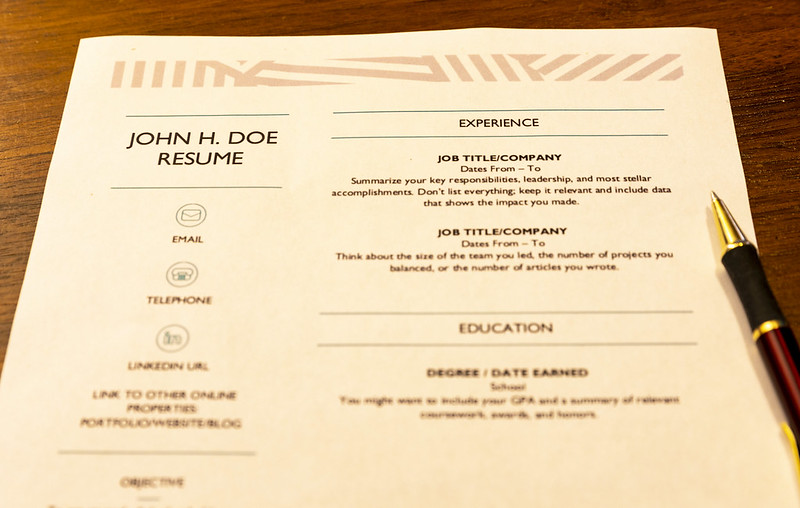
Image Credit: Alabama Extension
One of the most important jobs that we have as a manager is staffing our teams. We want to find the best and the brightest candidates and then convince them to join our team. If we can find the best, then we can interview them and try to get them excited about joining our company and our team. However, in order to interview them we first have to discover that they exist. This generally happens when we stumble across their resume and invite them in for an interview. How can we do a better job of discovering which candidates we should invite in based on their resume?
The Importance Of Résumé
There is an old saying that goes “…you can’t win a race in the first lap, but you can definitely lose one”. It turns that the same is true with résumés. Even the best résumé won’t, on its own, cause you to hire someone. However, but a relatively poor résumé will almost always get tossed into the “no” pile. Fair or unfair, we all know that that’s the reality. And that’s also the problem. It’s a problem because whom you decide (and, just as important, don’t decide) to interview eventually helps determine whom you hire — and as a result will determine the skills, talent, and expertise of the people around you.
So if we can all agree that it starts with a résumé, how do you define a “good” résumé? Or better yet, what does a “great” résumé look like? The good news is that science can at least partly answer the question. Researchers conducted a study “systematically examining the impression management (IM) content of actual résumés and cover letters and empirically testing their effect on applicant evaluation.” If we were to discuss what this study was all about, we’d say that the researcher tried to figure out what does and doesn’t work when it comes to crafting a résumé that lands a potential candidate a job interview.
What Makes A Résumé Work?
In general terms, it turns out that a little self-promotion (think about a few superlatives like “excellent” and “outstanding”) is good; a lot is not a good idea. Including a little ingratiation is good (think “I would love to be a part of such an awesome team” or “I would love to contribute to such a worthwhile mission”); once again a lot is not. As with most things in life, moderation is the key. A resume can be helpful, but only to a point. While what a candidate has done may be interesting, but what you care about most is what the person you hire can do as a member of your team. And to determine that, you are going to need a story.
We all know that a résumé should be built from the candidate’s journey, but it needs to be pointed to his or her future. A résumé that just scrolls through the past is a document that is going to elicit the wrong kinds of questions. The best résumés show that the candidate has the capacity to go where the candidate wants to go. As a manager what this means is that you have to craft your job postings properly. If you can do this, then your job will align with what you need the employee you hire to accomplish. According to research, what you ask for in a job posting is largely what you will end up getting. If you use a lot of superlatives in your job postings, and most candidates will respond with lots of superlatives. Talk a lot about your company’s mission and purpose and culture, and you’ll get plenty of ingratiation. So what’s a better approach? Imagine you’re looking for a candidate who has accomplished very specific things; a great résumé — and therefore a great candidate – will describe what the candidate has done, and will tell a story that indicates how their development and growth supports what you need them to actually do.
Managers need to understand that the best résumés are never just reflections of accomplishments and achievements. Instead, they’re well-curated documents that move the conversation to second- and third- interview turf. And that’s where the “questions” issue starts to come into play. Some résumés will spark the wrong kinds of questions: “Does the candidate have the right experience?” “Does the candidate possess the right attributes?” “Does the candidate possess the work ethic, interpersonal skills, and cultural fit?” Any questions like these questions will indicate doubt. What are the right questions? “That’s amazing; how did he do that?” “That was an interesting career move; I wonder why she shifted to a different functional role?” “Most team members didn’t spend their college summers working on archaeology digs; I wonder how that all ties together?”
What All Of This Means For You
A great résumé will provide the initial answers; a follow-on job interview will provide the deeper, more substantive answers. So what should a manager look for in a résumé? A great résumé will tell a story that doesn’t make you ask whether the candidate might be able do the job. A great résumé will leave you wanting to know not whether, but just how well, the candidate will do the job. Understand that if you don’t find yourself wondering that … then it’s not a great résumé.
– Dr. Jim Anderson
Blue Elephant Consulting –
Your Source For Real World IT Management Skills™
Question For You: If you reject a resume, do you think that it is worth it to have someone else take a look at it?
P.S.: Free subscriptions to The Accidental IT Leader Newsletter are now available. Learn what you need to know to do the job. Subscribe now: Click Here!

